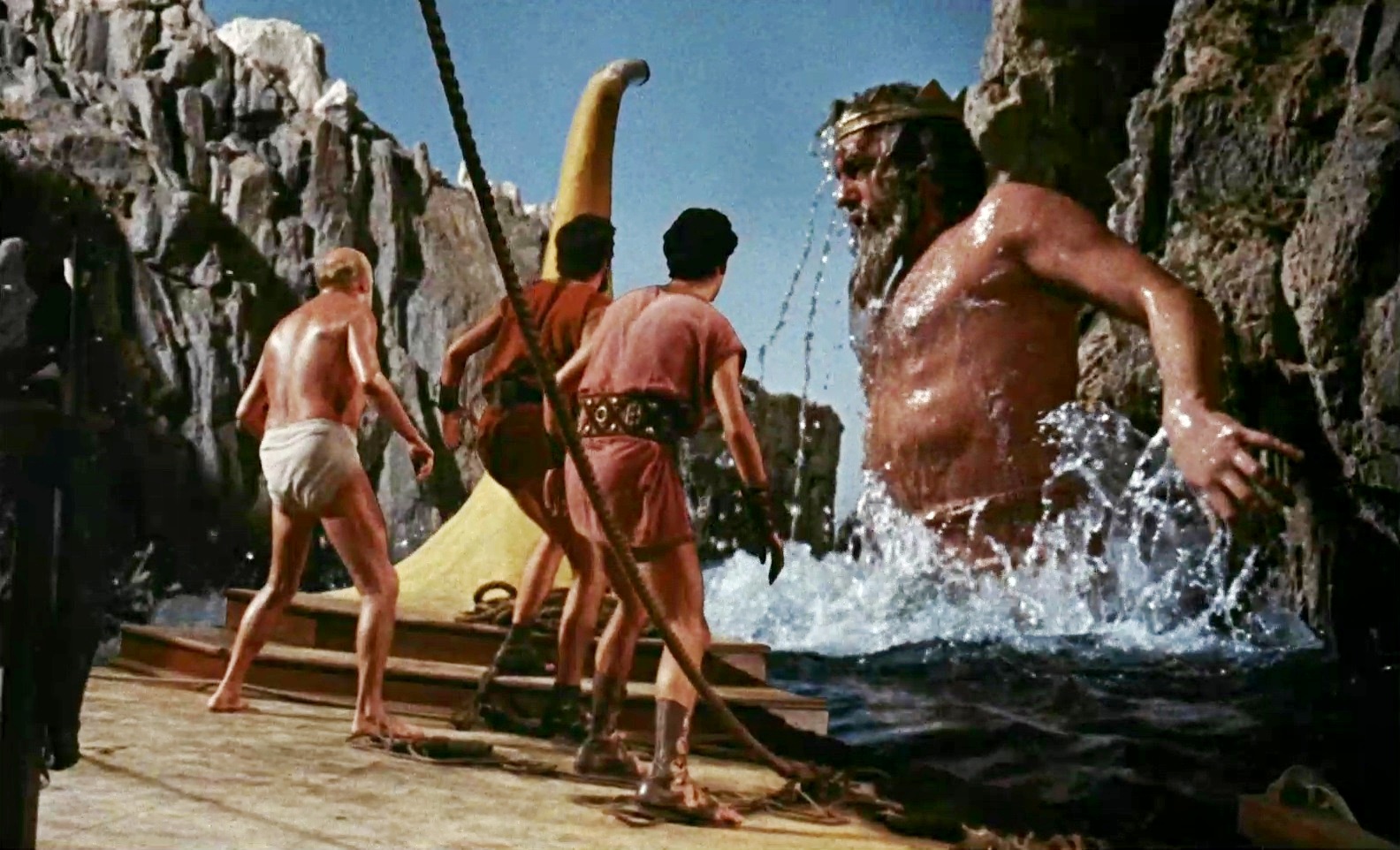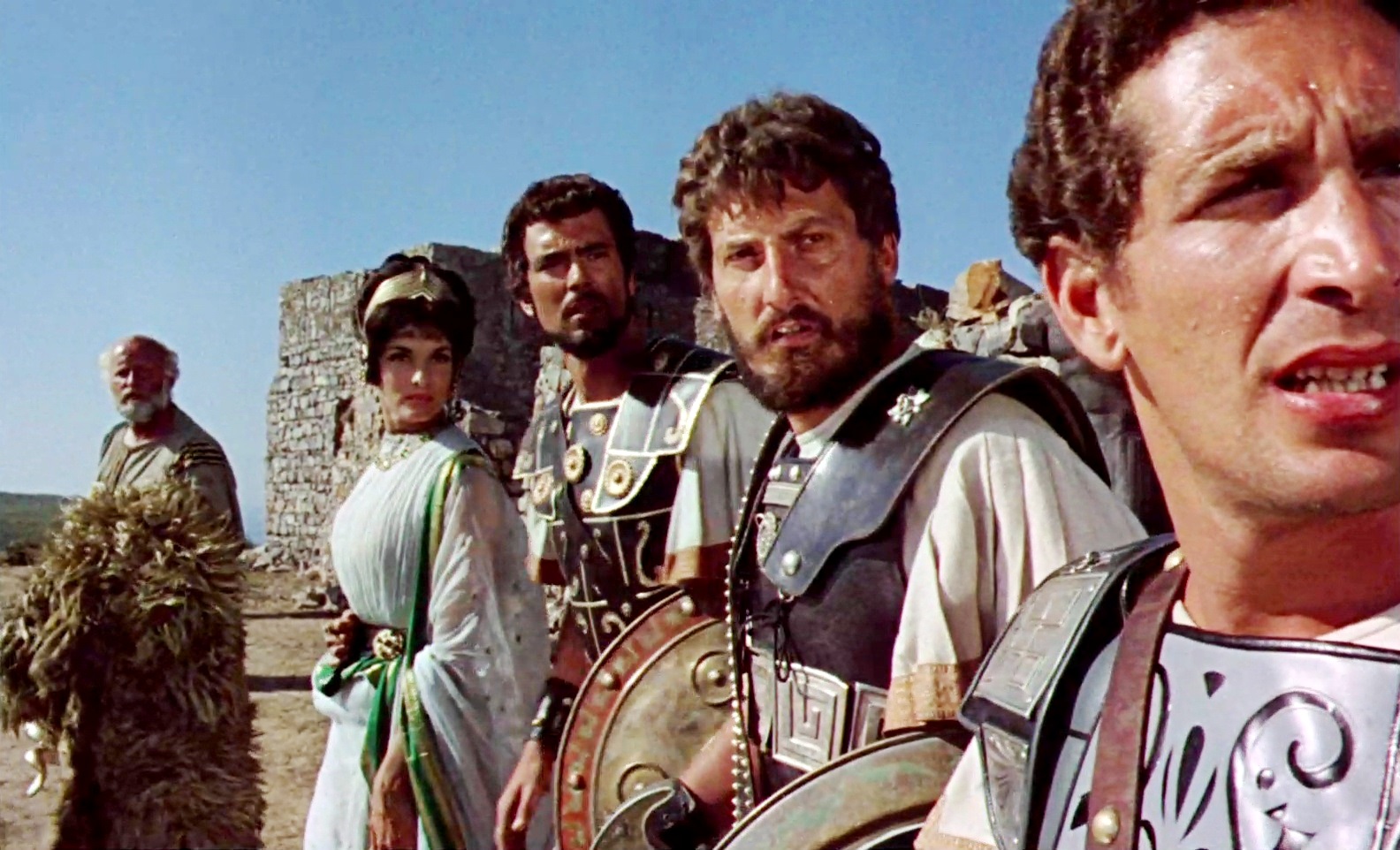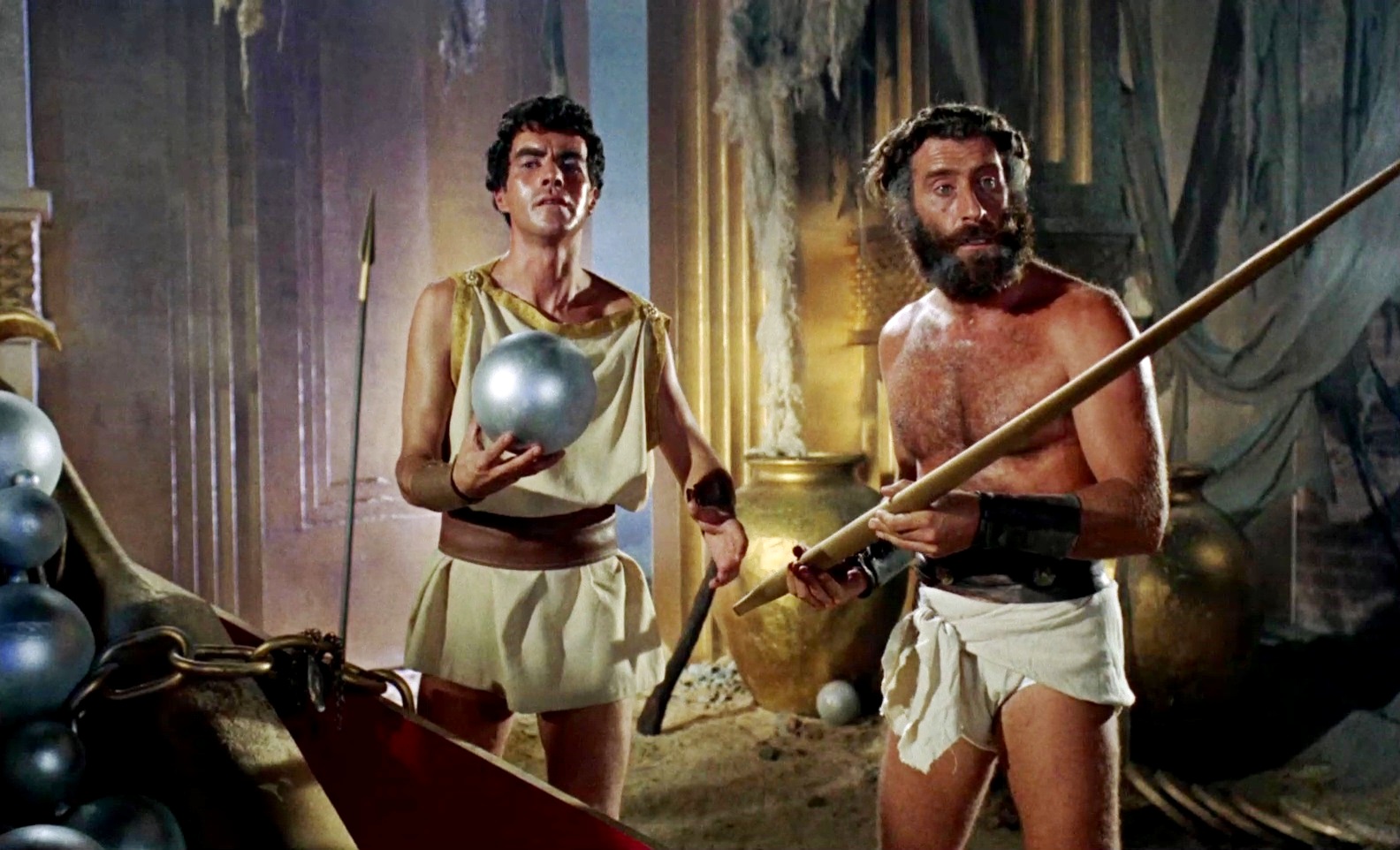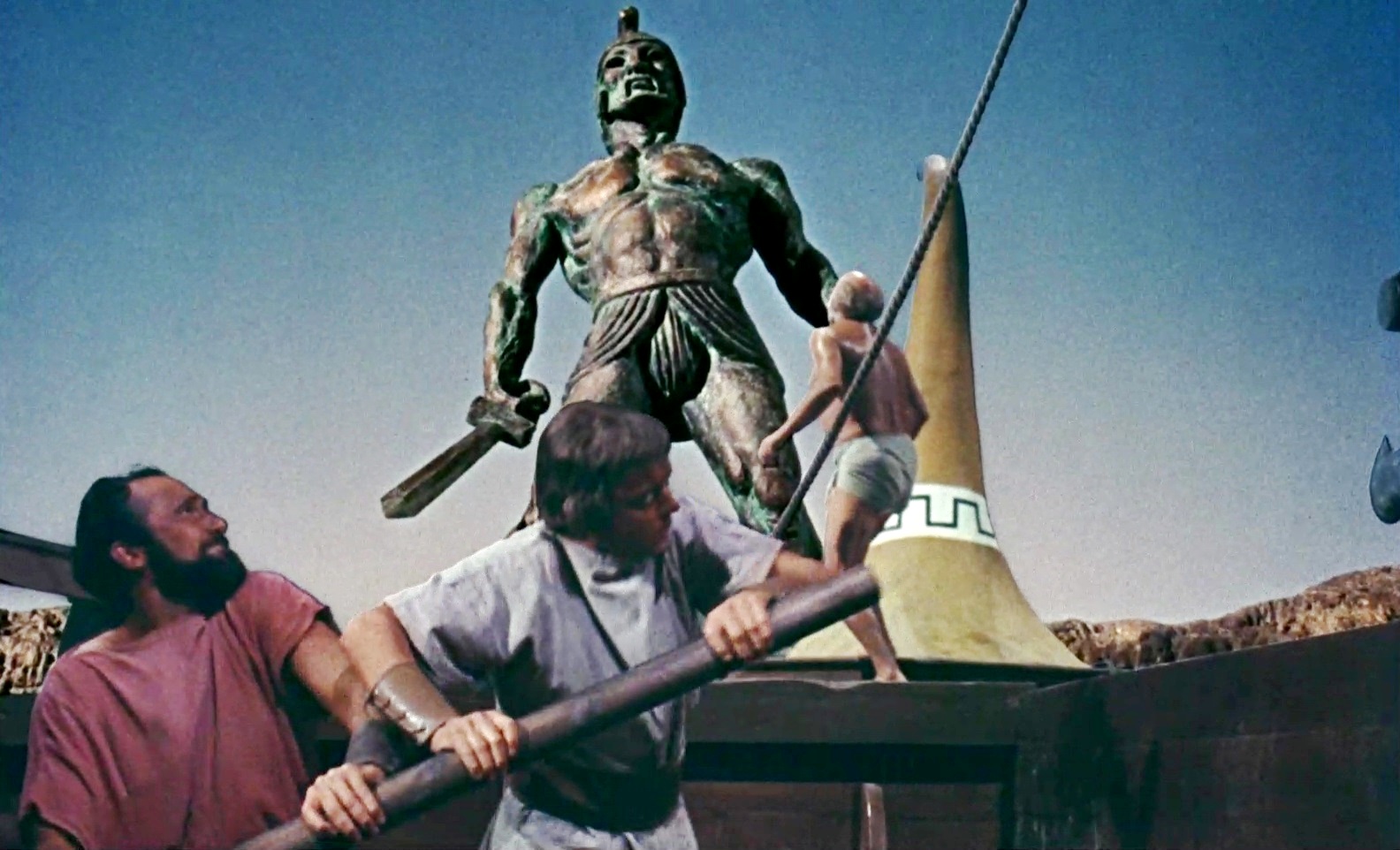

Visually and conceptually it adheres to aspects of the template Nathan Juran had established in his first collaboration with Harryhausen, The 7th Voyage of Sinbad (1958), expanding on some of that film’s ideas, like the final skeleton duel, but director Don Chaffey rejected Juran’s sprightly juvenilia for a slightly grittier, more darkly flavourful tone. Chaffey was a director who would later fit snugly, if with mostly lesser work, into the Hammer school with the sturdy, concrete sense of mise en scene that lends Jason and the Argonauts a necessary physicality that makes the folkloric mysticism all the more palpable. Jason and the Argonauts captures a culture that sees eternity in dead ashes and where the sea rises up in personified glory, the vestiges of temples harbour the truth of gods and all the hope of the world hangs in the branches of a tree, encapsulated in the skin of a dead ram, and where the ruins of an unknowably older, grander culture of titans and deities litter the landscape.


Pelias dispatches his own son Acastus (Gary Raymond) as one of the crew of the ship Jason has Argos (Laurence Naismith) build. Others in the crew he selects through a sports tournament include Hercules (Nigel Greene) and Hylas (John Cairney). On their epic voyage, they have to fight off a colossal animated statue, Talos, who guards a trove of the Gods’ treasures and the foundries of Hephaestus on the remote Isle of Bronze, trap the Harpies that torment seer Phineas (Patrick Troughton), and save Colchian emissary and priestess Medea (Nancy Kovack) from the waters of the Clashing Rocks. When they arrive in Colchis, the Argonaut are at first welcomed with open arms thanks to Medea proclaiming their heroism, but they are then imprisoned by the paranoid king Aeetes (Jack Gwillim), who’s been tipped off to Jason’s purpose by Acastus. The fate of the mission then rests in Medea’s hands.

Jason and the Argonauts is a more sober, grown-up film than other Harryhausen fantasy flicks, commencing with a surprisingly cold-blooded murder and following the original myth with a general fidelity, which makes it feel more substantial. The depiction of the Olympian Gods is cynical and even theologically angry, for Jason, in his quest to find the fleece, is defined as a doubter who, even when he’s spirited by Hermes (Michael Gwynn) to meet Zeus (Niall MacGinnis), Hera and the other Gods in Olympus, retains a defiant distaste for their caprices, and vows to prove that men can build ships and conjure the strength and wits that can conquer any natural or unnatural force. Although Jason is forced to still rely in the first part of his voyage on the five favours Zeus has allowed Hera to bestow on her mortal protégé (the number of times his sister begged her for aid that did not come), he’s finally left relying on his own wit and bravery. Zeus and Hera, although fascinated by the affairs of men, deal out justice and favours with a kind of amused condescension, and they’re quite emotionally removed from those affairs, having turned them into a literal chess match.

The gods become, then, neat ‘60s metaphors for the manipulations of political leaders and other figures of social hierarchy, and both Jason and Medea are characterised as being in rebellion against tyrannous, corrupt authority figures on earth and dissociated gods in the heavens. Medea’s own pleas to Hecate, the goddess she is a priestess for, to guide her in making a choice between Aeetes and Jason, fall on a statue’s deaf ears. The idea that the gods themselves face limits of their power and futures if men stop believing in them, a notion that Zeus contemplates with worldly weariness and gratitude that Hera remains with him even though they may fade, is amusingly rendered. The realistic stylisation, as opposed to the glistening idealised visions of the completely reinvented worlds in the likes of Excalibur or The Lord of the Rings trilogy (although the influence of Jason and the Argonauts and other Harryhausen films on Peter Jackson’s humongous work was deep), gives the emanations of the fantastic – the bones of the warrior skeletons sprouting of the ground, the colossal creaking form of Talos wrenching himself off his ageless pedestal – a unique tangibility. They really do seem to be springing out of the hot, dusty earth.

The restrained production values, compared to, say, another costume flick of the same year, the splashy Cleopatra, relies on some simple effects not too far from what you might see in an episode of Star Trek (Kovack appeared in an episode of that show, and in a similar role too, a couple of years later). But that’s a positive here, for there’s a flavour of the primevally cabalistic in Medea’s appearing caked in alien make-up for dancing and making incantations in Hecate’s temple, and in the sequence in which Jason finds the fleece itself: it’s suspended in the limb of a tree, guarded by a ferocious Hydra, a scene that’s the very likeness of a Joseph Campbellian myth-dream in its pellucid colouring and pantheistic imagery.

Jason’s a fairly flatly defined protagonist in his clean-cut, straightforward heroism, but his willingness to defy Zeus, suggesting the gods enjoy toying with humans when he witnesses a ship crushed in the Clashing Rocks and entrapping the Harpies which are a manifestation of his wrath, places that heroism intriguingly at odds with the scheme of life. Jason’s battling heaven and earth, and he comes out in front every time simply by being clever and brave; Medea, too, is ignored by Hecate when faced by a dilemma, but readily gives Aeetes what he wants in providing him with supernatural horrors to back up his despotism. This captures an authentic undertone implicit in the way the Ancient Greeks related to their myths, which were designed to inspire original thinking and provoke engaged moral and philosophical responses, and not merely make people shake with fear of eternity.

The relatively no-nonsense quality extends to the many of the actors. Greene’s Hercules, for instance, is thoroughly human and fallible – his moment of unthinking greed awakens Talos, endangers the Argo, and finally gets his friend Hylas killed. The possibility that Hercules and Hylas had a homoerotic union, inspiring Hercules’ morose departure from the Argonauts when he can’t find him, is only very vaguely suggested, but it’s still hazily perceptible, although, ironically, the film actually manages to almost entirely avoid the campiness that so often trickled through the sword-and-sandal films of the period. The no-name stars are a reminder that Harryhausen’s work was the real draw. The functionary pretty faces of Armstrong, who is one-dimensional, and sank immediately back into obscurity, and Kovack, certainly wouldn’t have brought in the crowds: both of their voices were post-dubbed by other actors. Which is a pity, especially as Medea deserves to be embodied by an actress with incantatory force. But both actors look right for their parts, at least. The supporting cast, on the other hand, is excellent, with such expert character actors as Wilmer, Naismith, MacGinnis, Blackman, Troughton and Gwillim (who would play Posiedon in Clash of the Titans: Troughton is particularly effective, shouting cries of defiant blasphemy at the heavens from which the goading Harpies and fires of hateful wrath fall.

Harryhausen’s most intensive labours were in creating the skeleton soldiers, resurrected victims of the Hydra, that Aeetes creates from that slain beast’s teeth, which Jason and his companions have to battle off, and that’s an amazingly intricate and well-handled sequence even by contemporary standards, the filmmakers contriving through painstaking choreography and animation to have the bony foes leap over obstacles, kick and slash and punch and grapple with the humans, with malevolent shrieks and somehow expressive fleshless faces that communicate infernal purpose. The time and expense in creating stop-motion figures often had a consequence of making the rest of what hit the screen in Harryhausen’s films, including the more prosaic special effects like matte work, look ropy, and here there’s some brittle moments, like the Argonauts falling from their ship, supposedly high in the air but obviously stationary in the sea, or being pelted by buckets of water standing in for catastrophic turbulence. But Chaffey works up the set-pieces, like the encounter with Poseidon when he braces the Clashing Rocks to allow the Argo to sail by, and the battle with the skeletons, with a true sense of the majesty and creepiness inherent in the tale.

The essential perversity of much Grecian myth remains beyond the reach of the filmmakers’ commercial reflexes, although there’s a hint of what grim things there in store for Jason and Medea, united in happiness at the end, as Zeus promises to return to them at a future date in keeping account of their offences. The actual conclusion is jarringly abrupt, fading out with the driving plot still unfulfilled, and that’s a distinct fault in a film that otherwise seems distinguished by its relative rigour of form and storytelling, and provokes the question whether the makers were eyeing a sequel. And yet, in another sense, there’s nothing more to be said that isn’t mere grammar. Bernard Herrmann contributed the score, as he had for 7th Voyage and Mysterious Island, with jangling rhythms that accompany the skeletons and the low sonorous woodwinds that infuse the landscapes with primal menace. It would be easy to overstate how successfully the film escapes the strictures of matinee filmmaking, but also easy to underrate how keenly this enters into its fantasy world. Like the fleece itself and the treasures of the Isle of Bronze, Jason and the Argonauts is a lovely artefact of a different epoch.

